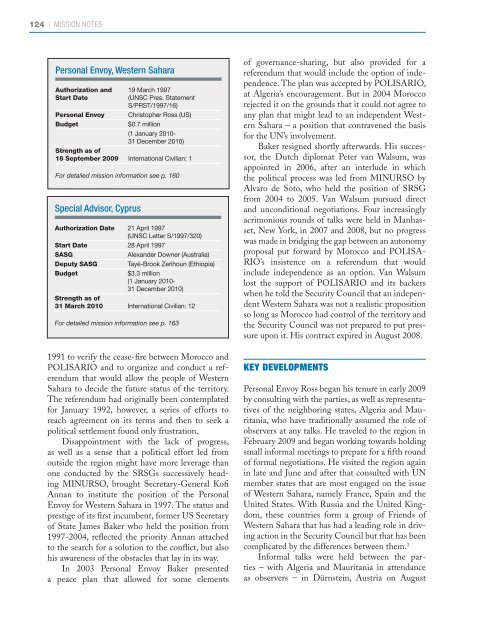here - Center on International Cooperation - New York University
here - Center on International Cooperation - New York University
here - Center on International Cooperation - New York University
Create successful ePaper yourself
Turn your PDF publications into a flip-book with our unique Google optimized e-Paper software.
124 | Missi<strong>on</strong> NotesPers<strong>on</strong>al Envoy, Western SaharaAuthorizati<strong>on</strong> and 19 March 1997Start Date(UNSC Pres. StatementS/PRST/1997/16)Pers<strong>on</strong>al Envoy Christopher Ross (US)Budget$0.7 milli<strong>on</strong>(1 January 2010-31 December 2010)Strength as of18 September 2009 Internati<strong>on</strong>al Civilian: 1For detailed missi<strong>on</strong> informati<strong>on</strong> see p. 160Special Advisor, CyprusAuthorizati<strong>on</strong> Date 21 April 1997(UNSC Letter S/1997/320)Start Date 28 April 1997SASGAlexander Downer (Australia)Deputy SASG Tayé-Brook Zerihoun (Ethiopia)Budget$3.3 milli<strong>on</strong>(1 January 2010-31 December 2010)Strength as of31 March 2010 Internati<strong>on</strong>al Civilian: 12For detailed missi<strong>on</strong> informati<strong>on</strong> see p. 1631991 to verify the cease-fire between Morocco andPOLISARIO and to organize and c<strong>on</strong>duct a referendumthat would allow the people of WesternSahara to decide the future status of the territory.The referendum had originally been c<strong>on</strong>templatedfor January 1992, however, a series of efforts toreach agreement <strong>on</strong> its terms and then to seek apolitical settlement found <strong>on</strong>ly frustrati<strong>on</strong>.Disappointment with the lack of progress,as well as a sense that a political effort led fromoutside the regi<strong>on</strong> might have more leverage than<strong>on</strong>e c<strong>on</strong>ducted by the SRSGs successively headingMINURSO, brought Secretary-General KofiAnnan to institute the positi<strong>on</strong> of the Pers<strong>on</strong>alEnvoy for Western Sahara in 1997. The status andprestige of its first incumbent, former US Secretaryof State James Baker who held the positi<strong>on</strong> from1997-2004, reflected the priority Annan attachedto the search for a soluti<strong>on</strong> to the c<strong>on</strong>flict, but alsohis awareness of the obstacles that lay in its way.In 2003 Pers<strong>on</strong>al Envoy Baker presenteda peace plan that allowed for some elementsof governance-sharing, but also provided for areferendum that would include the opti<strong>on</strong> of independence.The plan was accepted by POLISARIO,at Algeria’s encouragement. But in 2004 Moroccorejected it <strong>on</strong> the grounds that it could not agree toany plan that might lead to an independent WesternSahara – a positi<strong>on</strong> that c<strong>on</strong>travened the basisfor the UN’s involvement.Baker resigned shortly afterwards. His successor,the Dutch diplomat Peter van Walsum, wasappointed in 2006, after an interlude in whichthe political process was led from MINURSO byAlvaro de Soto, who held the positi<strong>on</strong> of SRSGfrom 2004 to 2005. Van Walsum pursued directand unc<strong>on</strong>diti<strong>on</strong>al negotiati<strong>on</strong>s. Four increasinglyacrim<strong>on</strong>ious rounds of talks were held in Manhasset,<strong>New</strong> <strong>York</strong>, in 2007 and 2008, but no progresswas made in bridging the gap between an aut<strong>on</strong>omyproposal put forward by Morocco and POLISA-RIO’s insistence <strong>on</strong> a referendum that wouldinclude independence as an opti<strong>on</strong>. Van Walsumlost the support of POLISARIO and its backerswhen he told the Security Council that an independentWestern Sahara was not a realistic propositi<strong>on</strong>so l<strong>on</strong>g as Morocco had c<strong>on</strong>trol of the territory andthe Security Council was not prepared to put pressureup<strong>on</strong> it. His c<strong>on</strong>tract expired in August 2008.Key developmentsPers<strong>on</strong>al Envoy Ross began his tenure in early 2009by c<strong>on</strong>sulting with the parties, as well as representativesof the neighboring states, Algeria and Mauritania,who have traditi<strong>on</strong>ally assumed the role ofobservers at any talks. He traveled to the regi<strong>on</strong> inFebruary 2009 and began working towards holdingsmall informal meetings to prepare for a fifth roundof formal negotiati<strong>on</strong>s. He visited the regi<strong>on</strong> againin late and June and after that c<strong>on</strong>sulted with UNmember states that are most engaged <strong>on</strong> the issueof Western Sahara, namely France, Spain and theUnited States. With Russia and the United Kingdom,these countries form a group of Friends ofWestern Sahara that has had a leading role in drivingacti<strong>on</strong> in the Security Council but that has beencomplicated by the differences between them. 1Informal talks were held between the parties– with Algeria and Mauritania in attendanceas observers – in Dürnstein, Austria <strong>on</strong> August
















